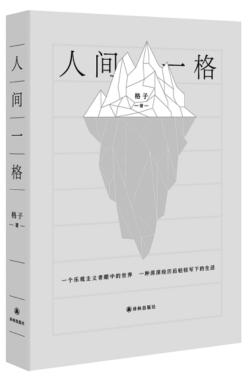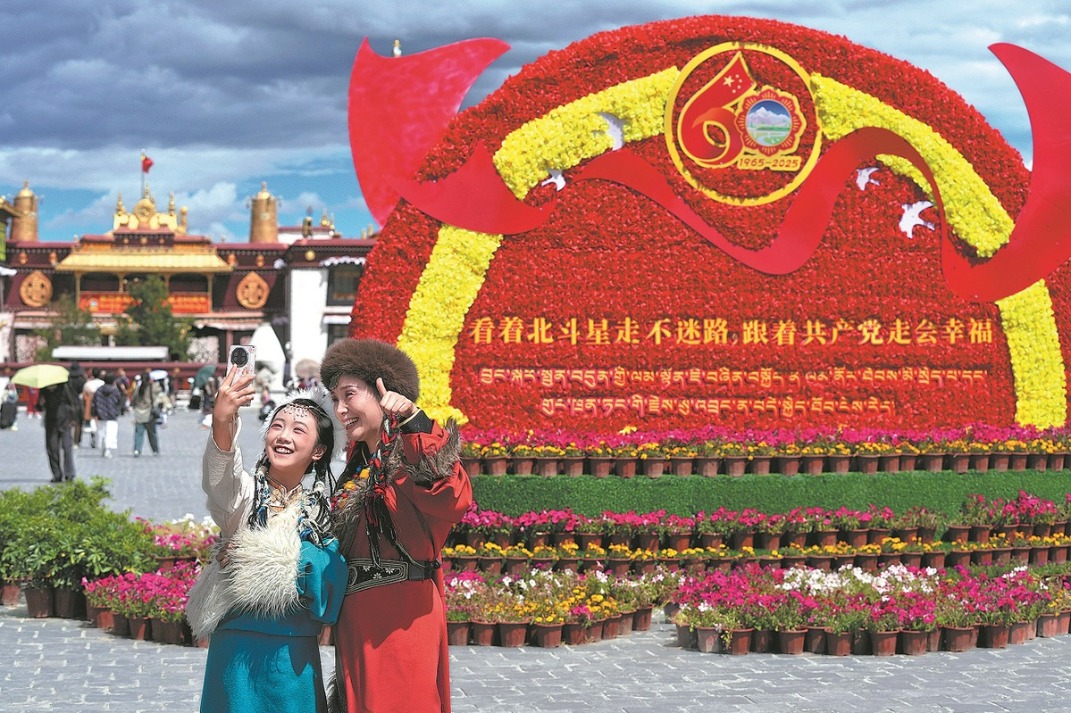An elevated view
Through a collection of essays, newly published author, Gezi, applies his unique rural perspective to a plethora of contemporary subjects, Yang Yang reports.

In the early 1990s, when Liu Shaohua was still a toddler living in Liuzhuang village in Weifang, East China's Shandong province, his mother would take him to the fields where she grew corn, peanuts or cotton plants, since there was nobody else to look after the boy.
One summer afternoon, when the hungry mother took a break and held him up from the cushion on which he lay prone, she found a big speckled snake coiled beneath the cushion.
It "seemed to have spent the morning together with me", writes 34-year-old Liu, under his pen name Gezi, in an article, The Boy on the Tree, which is one of a collection of essays that appear in his recently published first book, Renjian Yige (New Driver).
The mother was so terrified that she grabbed a nearby shovel and beat the 2-meter-long reptile to death. To avoid further peril, she decided to perch him amid the branches of a big willow that ramified at the height of 1.8 meters, "unaware that snakes actually could climb up trees".
In the following two to three years, Gezi would stay on the willow when his mother worked in the field, and gradually acquired a new perspective of the village and the world from above, just like Italian Italo Calvino writes in his 1957 novel, The Baron in the Trees, "that anyone who wants to see the earth properly must keep himself at a necessary distance from it".
Gezi writes that he remembers his childhood started from those days spent on the tree. Up on the willow, the little boy got to scrutinize the wetland of the Lizi Bend and the surrounding fields for the first time.
He saw how a boy chased after a panicked sparrow that, forgetting to fly high enough due to its long stay in the reeds, died from exhaustion, and how the spring returned life to the land gradually and spectacularly after a dead winter. With this elevated perspective, observing all below like some minor deity, it is, perhaps, only natural that Gezi would become a writer, displaying a gift for it since middle school.
After spending a warm and happy childhood, into his teenage years, in the rural area, at 18, Gezi left the village for Wuhan University in Central China's Hubei province to study journalism, and continued his study with a postgraduate degree at Tsinghua University in Beijing. He then landed the job as a journalist, based in Beijing, and traveled around the world.
Unlike many young people living in metropolitan cities, who increasingly tend to shun the occasions to meet people in person, Gezi saw the world as his village, where people are interconnected with each other in a tremendous web of kinship.
He remembers when he was little, his father ran a repair shop for farm machinery, where he discovered that, curiously, his father seemed to know every customer very well. The father would wear a big smile, welcome the customer and start fixing the problem. After finishing the work, he would tell them that the repair was free of charge, and at the customer's insistence, he would offer a very low price.
After the customer left, the father would tell the son that the customer was some distant relative from a village that his married sister lived in, so the charge was low because of the relationship. If the rule of "six degrees of separation" applies to the world at large, Gezi says, in the village, it is "two degrees".
Growing up in such a web, villagers have mastered the rules of living in an acquaintance-driven society, and even if they leave the village and visit a city like Beijing, they tend to turn the strange surroundings into a similar network of acquaintances, Gezi says.
"When my father came to Beijing, he talked to people wherever he went. Both he and I see the world with a level of friendliness and openness that can go over and above the norm."
In an essay, Gezi amusingly writes: "My father, who had been living in the countryside for too long, tended to talk to anyone he met. When he took me to the town, he would stop to talk to 20 to 30 people, so shopping was the only thing that we would have time to do in the morning. When he came to live in the city, he still liked talking to people as if they had known each other their whole lives. You could easily tell by the response of the other party whether they came from the city or the countryside. City dwellers would cast a wary eye at him before deciding to answer or not, but those from the countryside would always reply without hesitation."
In Beijing, the closeness between Gezi and his hairdressers, fitness instructors, deliverymen, masseurs and staff of the restaurants that he frequents goes far beyond the supposedly normal level for a city.
"There exists an unusual trust between us. I treat them like family," he says.
He tends to adopt an anthropological perspective to study all the kind of people he meets, holding that everyone has their spot in the tremendous web of the world.
"Big figures occupy a bigger spot and minnows have their relatively small space, and all the spots are clearly outlined, so don't assume that one can have the whole world," Gezi says on a podcast.
"At most, you can tell the logic of how the world runs from your own point of view, and when I wrote the book, I opened the door of my space to see the world from my perspective," he says.
Originally, the book was to include his interviews, but at the end of 2021, inspired by the works of French essayist Michel Montaigne (1533-92), he decided to try this literary form, especially as his essays had already won many readers online.
In six months, he finished 34 essays about topics ranging from his childhood memories, his experience in hospital, his bookmarkers, his opinions about a supermarket and his kind, beloved maternal grandmother, to Beijing's hutong, the Ewenki people in the forests of Northeast China, whose fathers and grandfathers were the last generations of hunters, and the people who try to protect wild swans.
"At first, I wanted to only write about my hometown, but after some time, I realized that this topic was too simple for me, so I wanted to try something else," he says.
"Actually, my hometown has become a part of me, and when I travel, it's always there in my heart. It has shaped my view of the world and my way of thinking and making friends — everything about me — so there's no need to limit my topics to the village."
Many Chinese writers have written about rural areas, especially the older generation of writers, often more about the hardship and suffering of country life, which Gezi says he is not comfortable with.
"I often feel that the rural areas described by writers from other countries are enviable, such as those fantastic places by (Gabriel) Garcia Marquez (Colombian novelist) or Calvino. But in many Chinese literary works, the rural areas seem to be full of misery and suffering. I'm not happy with that, because I had a very happy childhood and the countryside in my memories is very interesting," he says.
"Our countryside has a very beautiful side, which has not been properly represented," he says.
He says there are probably more than 100 million people born since the 1980s who have moved from the countryside to cities, including himself.
"In Liuzhuang, for example, there are few people younger than 45 years old. We have grown up healthily, and become the builders and pillars of cities, so why do we vilify the villages that we lived in," he says.
"So, I want to describe my experience with my hometown honestly. You cannot demand that all the villagers truly love you, but a person can feel the warmth of an acquaintance society and feel secure due to a familiarity with people as much as with locusts, cicadas, every tree, many flowers and the crops in the fields. These feelings are real," he says.
Gezi employs a simple but accurate style in his writing, a style he has been seeking for years.
"In my 20s, I wrote a lot, but I couldn't create a book, mostly because I didn't find my own voice," he says. "But now I think I have found it."
Mai Jia, writer of Decoded, compares his style to that of American writer Ernest Hemingway.
"Gezi reminds me of Hemingway. Starting as a journalist, writing for him is like going home. This is also a book about 'going home', the home for people, for the century, for love and truth, and for the heart. … Like Hemingway, Gezi always gives you strength for a desperate fight in the undulating poetic narration," Mai says.


Today's Top News
- Putin-Zelensky meeting not being planned, intense mutual attacks persist
- China, Japan, ROK urgently need an FTA
- From humanoids to parallel intelligence
- Shared wartime history unites nations, envoy says
- Mutual trust reaffirmed in visit
- 12 dead, 4 missing after bridge collapses in Qinghai































